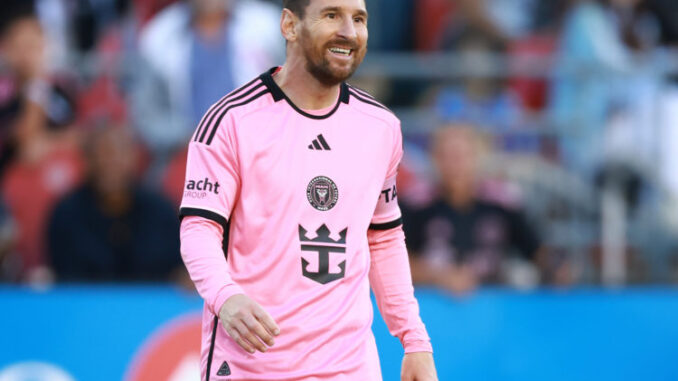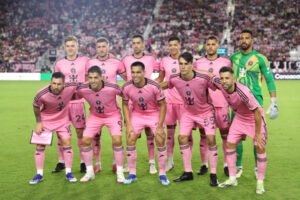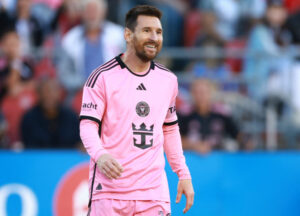
Julian Gressel Hails Miami Figures for MLS Achievement: It’s Not About Lionel Messi

In recent months, Major League Soccer (MLS) has witnessed a surge of attention, particularly with the arrival of global football superstar Lionel Messi to Inter Miami. However, while Messi’s influence is undeniable, Julian Gressel, the Atlanta United winger, has emphasized that the league’s growth and success extend far beyond the presence of a single star player. Gressel’s perspective sheds light on the multifaceted achievements within MLS and highlights other key figures and elements contributing to the league’s rising prominence.
The Impact of a Star Player

Gressel recognizes the magnetic draw that a player like Messi brings to MLS. The Argentine’s signing not only elevates the profile of Inter Miami but also enhances the league’s global visibility. Ticket sales surge, television ratings spike, and sponsorship deals flourish whenever such high-profile players take the field. However, Gressel argues that focusing solely on Messi can overshadow the collective efforts and talents that have helped shape MLS into a competitive and exciting league.
Emerging Talents
Beyond the spotlight on Messi, Gressel highlights the emergence of young American talent as a crucial component of MLS’s evolution. Players like Gianluca Busio, Brenden Aaronson, and others have proven that homegrown talent can thrive on the national and international stage. These players are not only showcasing their skills in MLS but are also making their mark in Europe, thus reflecting the growing quality of football in the United States.
The pathway for American players has expanded significantly in recent years, with MLS acting as a springboard for talent to showcase their abilities. Gressel himself is a product of this system, having been drafted from a small college program into a league that now attracts global attention. He emphasizes that the growth of young players is crucial for the sustainability of MLS and for the future of U.S. soccer.
Club Development and Investment
Gressel also points to the significant investment by clubs in infrastructure, coaching, and youth development. This investment has fostered an environment where players can hone their skills and thrive. Facilities have improved, and the quality of coaching has elevated, allowing players to develop more effectively than ever before. Teams are prioritizing youth academies, which has not only helped in scouting local talent but also in creating a robust footballing culture within communities.
This development is evident in clubs like Atlanta United, where Gressel began his career. The club’s commitment to building a winning culture, attracting fans, and developing players has been instrumental in shaping the MLS landscape. The vibrant atmosphere in MLS stadiums, filled with passionate fans, underscores the league’s growing status as a competitive force in American sports.
Competitive Parity
Another aspect that Gressel underscores is the increasing competitive parity in MLS. No longer is it just a two or three-horse race for the championship. The league has seen a rise in the competitiveness of multiple teams, making it difficult to predict outcomes and fostering exciting matches. This parity attracts fans who appreciate the unpredictability of each season.
Gressel notes that this competitive balance is vital for the league’s long-term success. It encourages clubs to invest in their rosters and scouting networks, ensuring that every team can field a competitive squad. The increased level of competition also raises the stakes for individual players, enhancing their development and performance on the field.
The Role of Coaches
Gressel also points to the importance of coaching in MLS’s growth. With a diverse range of coaching philosophies brought in from around the world, the tactical sophistication of the league has increased significantly. Coaches from various backgrounds are enriching the tactical landscape of MLS, pushing players to elevate their games. The blend of different styles creates a dynamic playing environment that is enjoyable for fans and challenging for players.
The Future of MLS
As MLS continues to grow, Gressel remains optimistic about the future of American soccer. The league is poised to expand its reach even further, with upcoming expansions and a commitment to promoting soccer culture in the U.S. The establishment of rivalries, the cultivation of local talent, and the ongoing development of infrastructure will be pivotal in solidifying the league’s status as a premier destination for football.
The league’s alignment with major global events, such as the upcoming World Cup in the U.S., Mexico, and Canada in 2026, will further amplify interest and investment in the sport. Gressel believes that this is an opportunity for MLS to showcase its growth and to highlight the talents of American players and coaches on an international stage.
Conclusion
While Lionel Messi’s arrival has undoubtedly transformed the landscape of MLS, Julian Gressel’s insights remind us that the league’s achievements cannot be reduced to a single figure. The collective efforts of emerging talents, investment in youth development, increased competitive parity, and innovative coaching are the true cornerstones of MLS’s growth. As the league continues to evolve, it is essential to recognize the myriad contributions that have helped it become a vibrant and competitive force in the world of soccer. Gressel’s perspective encourages fans and stakeholders alike to look beyond the headlines and appreciate the depth and breadth of talent and dedication that is shaping the future of American soccer.
Leave a Reply